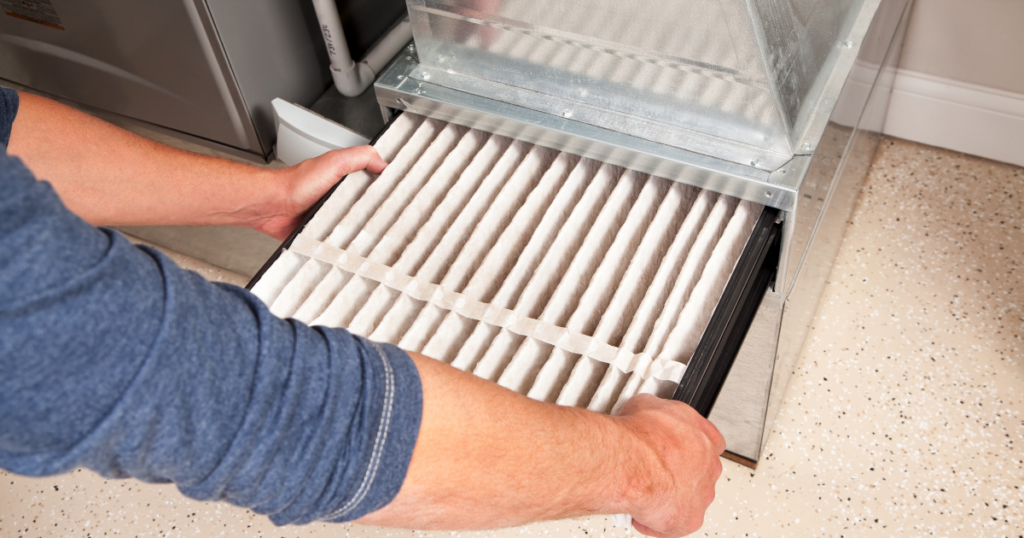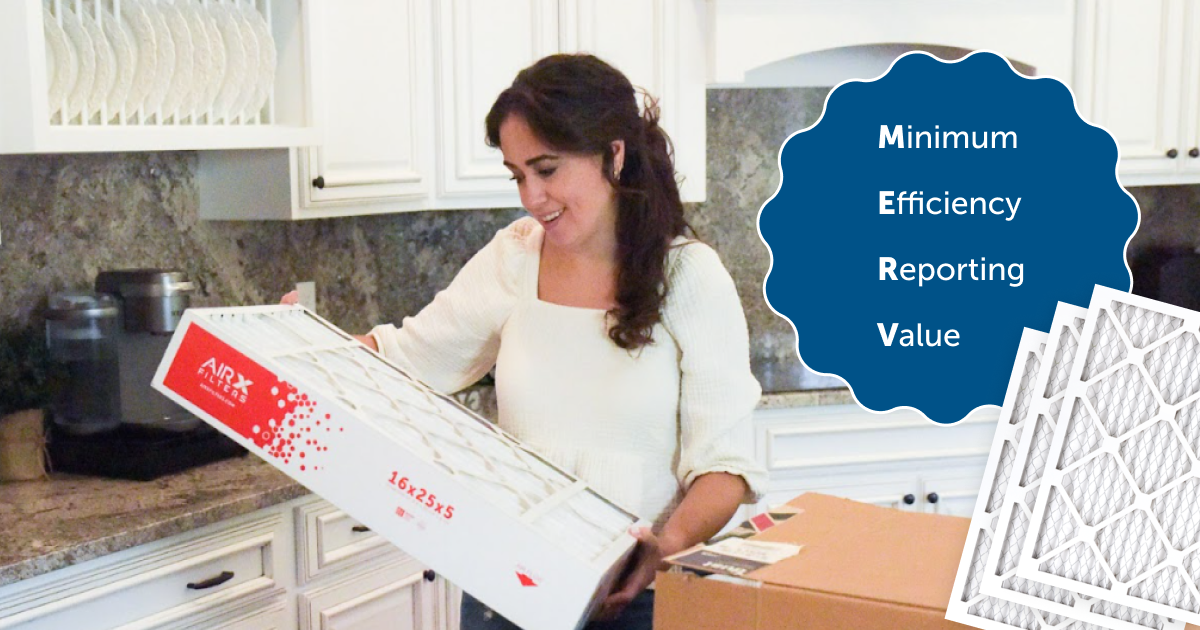Purchasing a new air conditioner (often referred as AC) filter is not an impulse decision. For many, home air quality is one of the most important health considerations for themselves and loved ones. Filters come in many different ratings to balance those health needs with efficiency. To make sure you’re truly getting the maximum benefit from your filter, do some research beforehand to find the type that fits your needs–these range from basic dust filtration, to filtering common allergens, to filtering microscopic viruses and bacteria.
Understanding the MERV rating is the best place to start when shopping for new AC or furnace filters. First off, you may be wondering, what is a MERV rating? MERV stands for Minimum Efficiency Reporting Value. Designed in 1987 by the American Society of Heating, Refrigerating and Air-Conditioning Engineers (ASHRAE), a MERV rating gives an accurate description of what size of particles the air filter can remove from the air while maintaining efficiency.
Understanding MERV Ratings for Air Filters
The next question you may be asking yourself is, “How do I know which MERV rating is best for me?” There are a few ways to determine which AC filter type is the most suitable for you, and in the case of MERV ratings, a higher rating doesn’t necessarily indicate a better filter. The ratings given to AC and furnace filters describe the worst-case performance of a filter when encountering particles like dust, pollen, and other contaminants of a specific size. The scale ranges from 0.3 to 10 microns. Higher-rated filters means a higher percentage of particles are being captured. Below is a breakdown of the MERV rating scale and our best recommendations which can be found in the following popular sizes found in most homes and offices: 20x20x1, 18x20x1, 14x20x1, 20x25x1, and 16x25x1 air filters.

Basic Air Filters:
MERV Rating 1-4 (Particle Size: >10 μm)
Air filters with this rating are commonly used in industrial workplaces and sometimes residential buildings. These filters offer minimal filtration, helping to capture particles that include pollen, dust mites, textile fibers, and carpet fibers. Essentially, it does the bare minimum to protect your HVAC unit if replaced regularly. At Discount Filters, our Fiberglass Panel Air Filter – MERV 4 is the recommended choice for this. Since these filters only obstruct basic particles, a MERV rating of 1-4 will not do an efficient job of removing all airborne contaminants like dust or allergens. Since this is the case, we recommend choosing a slightly higher MERV rating when shopping for an AC filter for your home.
Air Filters for Dust:
Rating 5-8 (Particle Size: 10.0-3.0 μm)
Filters of these ratings are commonly found in standard residential areas, commercial buildings, and industrial workplaces. A MERV rating between 5-8 is helpful in blocking particles of a smaller size like pollen, pet dander, dust mites, and lint. For trapping lint, pollen, dust, and dust mites, we recommend our AIRx Dust Prevention Air Filter – MERV 8. For trapping all of the above and more like pet dander and chemical vapors, choose the AIRx Odor Air Filter – MERV 8. These filters are recommended as the standard for everyday home filtration.
Air Filters for Allergies:
Rating 9-12 Particle Size: 3.0-1.0 μm
For more controlled environments like a home, air filters with a MERV rating between 9-12 are best, as they filter particles such as humidifier dust, lead dust, smog, mold spores, and legionella. These filters are typically found in higher-end commercial buildings, hospital laboratories, and homes (depending on your HVAC system). Filters with a MERV 9-12 rating are ideal for people with allergies. At Discount Filters, MERV 11 air filters like the AIRx Allergy Prevention Air Filter and the AIRx High Flow Air Filter are both considered optimal choices.
Air Filters for Bacteria:
Rating 13-16 (Particle Size: 1.0-0.3 μm)
Filters in this MERV rating range are not typically found in residential buildings. These filters are used for more controlled air environments such as hospitals and surgery operating rooms. MERV rating 13-16 filters can block particles such as bacteria, droplet nuclei found in sneezes, smoke, insecticide, and mold spores. In this range, AIRx Health Air Filter – MERV 13 traps smog, bacteria, mold spores, tobacco smoke, aerosols, and more. This level of filtration is recommended for the homes of people with respiratory issues such as asthma.
Air Filters for Viruses:
Rating 17-20 (Particle Size: <0.3 μm)
MERV ratings between 17-20 are the highest and most effective for blocking the smallest range of particles. These filters are used for the most controlled environments like manufacturing plants and hospitals. We also find pharmaceutical and electronics companies utilize these high rated filters for their manufacturing cleanrooms. Particles including viruses, carbon dust, sea salt, and smoke are all contained by filters in this category.
The Environmental Protection Agency of the United States recommends medium efficiency air conditioner filters for residential buildings. Filters between the ranges of 5-13 do a reasonably efficient job of removing airborne particles. Filters with a higher rating run the risk of increasing airflow resistance which can cause your home system to run inefficiently. The highest recommended range for residential systems is 9-12, since higher ratings are considerably better suited for hospitals and commercial buildings where a sterile environment is required.
Other Frequently Asked Questions
What MERV rating is best for home use?
MERV Rating 8–13. Air filters with a MERV rating of 8–13 are usually considered higher-end filters and are best suited for home use. These filters help trap dust, smog, odor, and a couple other smaller particles, making them an exceptional choice for use in homes and businesses.
Is MERV 11 too high for home use?
Depending on your home’s HVAC system requirements, it’s helpful to check beforehand whether a MERV 11 air filter is a good fit or not. In most cases, a MERV 11 air filter isn’t too high for residential use. Generally speaking, anything under a MERV 13 air filter should provide very efficient air purification in a home without impacting airflow.
Which is better: MERV 8 or 10?
A home with no pets, smoke, or allergies will do just fine with a MERV rating of 1-7. If you have pets or someone in your home has significant allergy problems, you may want to consider a higher MERV value, such as anywhere between 8-10. For homes with smokers or a wood-burning fireplace, we strongly suggest a filter with a 11–13 MERV rating.
Which is better: MERV 11 or 13?
Both filters are exceptional choices for trapping the smallest of particles. The difference is that while both a MERV 11 filter and a MERV 13 filter trap very similar particles, MERV 13 is able to remove some viruses and bacteria that a MERV 11 can’t.

